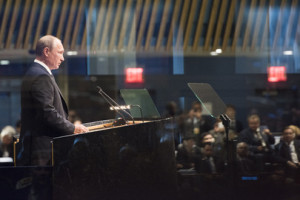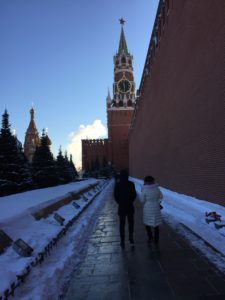Has the NYT Gone Collectively Mad?
Special Report: Crossing a line from recklessness into madness, The New York Times published a front-page opus suggesting that Russia was behind social media criticism of Hillary Clinton, reports Robert Parry.
For those of us who have taught journalism or worked as editors, a sign that an article is the product of sloppy or dishonest journalism is that a key point will be declared as flat fact when it is unproven or a point in serious dispute – and it then becomes the foundation for other claims, building a story like a high-rise constructed on sand.
This use of speculation as fact is something to guard against particularly in the work of inexperienced or opinionated reporters. But what happens when this sort of unprofessional work tops page one of The New York Times one day as a major “investigative” article and reemerges the next in even more strident form as a major Times editorial? Are we dealing then with an inept journalist who got carried away with his thesis or are we facing institutional corruption or even a collective madness driven by ideological fervor?
What is stunning about the lede story in last Friday’s print edition of The New York Times is that it offers no real evidence to support its provocative claim that – as the headline states – “To Sway Vote, Russia Used Army of Fake Americans” or its subhead: “Flooding Twitter and Facebook, Impostors Helped Fuel Anger in Polarized U.S.”
In the old days, this wildly speculative article, which spills over three pages, would have earned an F in a J-school class or gotten a rookie reporter a stern rebuke from a senior editor. But now such unprofessionalism is highlighted by The New York Times, which boasts that it is the standard-setter of American journalism, the nation’s “newspaper of record.”
In this case, it allows reporter Scott Shane to introduce his thesis by citing some Internet accounts that apparently used fake identities, but he ties none of them to the Russian government. Acting like he has minimal familiarity with the Internet – yes, a lot of people do use fake identities – Shane builds his case on the assumption that accounts that cited references to purloined Democratic emails must be somehow from an agent or a bot connected to the Kremlin.
For instance, Shane cites the fake identity of “Melvin Redick,” who suggested on June 8, 2016, that people visit DCLeaks which, a few days earlier, had posted some emails from prominent Americans, which Shane states as fact – not allegation – were “stolen … by Russian hackers.”
Shane then adds, also as flat fact, that “The site’s phony promoters were in the vanguard of a cyberarmy of counterfeit Facebook and Twitter accounts, a legion of Russian-controlled impostors whose operations are still being unraveled.”
The Times’ Version
In other words, Shane tells us, “The Russian information attack on the election did not stop with the hacking and leaking of Democratic emails or the fire hose of stories, true, false and in between, that battered Mrs. Clinton on Russian outlets like RT and Sputnik. Far less splashy, and far more difficult to trace, was Russia’s experimentation on Facebook and Twitter, the American companies that essentially invented the tools of social media and, in this case, did not stop them from being turned into engines of deception and propaganda.”
Besides the obvious point that very few Americans watch RT and/or Sputnik and that Shane offers no details about the alleged falsity of those “fire hose of stories,” let’s examine how his accusations are backed up:
“An investigation by The New York Times, and new research from the cybersecurity firm FireEye, reveals some of the mechanisms by which suspected Russian operators used Twitter and Facebook to spread anti-Clinton messages and promote the hacked material they had leaked. On Wednesday, Facebook officials disclosed that they had shut down several hundred accounts that they believe were created by a Russian company linked to the Kremlin and used to buy $100,000 in ads pushing divisive issues during and after the American election campaign. On Twitter, as on Facebook, Russian fingerprints are on hundreds or thousands of fake accounts that regularly posted anti-Clinton messages.”
Note the weasel words: “suspected”; “believe”; ‘linked”; “fingerprints.” When you see such equivocation, it means that these folks – both the Times and FireEye – don’t have hard evidence; they are speculating.
And it’s worth noting that the supposed “army of fake Americans” may amount to hundreds out of Facebook’s two billion or so monthly users and the $100,000 in ads compare to the company’s annual ad revenue of around $27 billion. (I’d do the math but my calculator doesn’t compute such tiny percentages.)
So, this “army” is really not an “army” and we don’t even know that it is “Russian.” But some readers might say that surely we know that the Kremlin did mastermind the hacking of Democratic emails!
That claim is supported by the Jan. 6 “intelligence community assessment” that was the work of what President Obama’s Director of National Intelligence James Clapper called “hand-picked” analysts from three agencies – the Central Intelligence Agency, National Security Agency and Federal Bureau of Investigation. But, as any intelligence expert will tell you, if you hand-pick the analysts, you are hand-picking the conclusions.
Agreeing with Putin
But some still might protest that the Jan. 6 report surely presented convincing evidence of this serious charge about Russian President Vladimir Putin personally intervening in the U.S. election to help put Donald Trump in the White House. Well, as it turns out, not so much, and if you don’t believe me, we can call to the witness stand none other than New York Times reporter Scott Shane.
Shane wrote at the time: “What is missing from the [the Jan. 6] public report is what many Americans most eagerly anticipated: hard evidence to back up the agencies’ claims that the Russian government engineered the election attack. … Instead, the message from the agencies essentially amounts to ‘trust us.’”
So, even Scott Shane, the author of last Friday’s opus, recognized the lack of “hard evidence” to prove that the Russian government was behind the release of the Democratic emails, a claim that both Putin and WikiLeaks founder Julian Assange, who published a trove of the emails, have denied. While it is surely possible that Putin and Assange are lying or don’t know the facts, you might think that their denials would be relevant to this lengthy investigative article, which also could have benefited from some mention of Shane’s own skepticism of last January, but, hey, you don’t want inconvenient details to mess up a cool narrative.
Yet, if you struggle all the way to the end of last Friday’s article, you do find out how flimsy the Times’ case actually is. How, for instance, do we know that “Melvin Redick” is a Russian impostor posing as an American? The proof, according to Shane, is that “His posts were never personal, just news articles reflecting a pro-Russian worldview.”
As it turns out, the Times now operates with what must be called a neo-McCarthyistic approach for identifying people as Kremlin stooges, i.e., anyone who doubts the truthfulness of the State Department’s narratives on Syria, Ukraine and other international topics.
Unreliable Source
In the article’s last section, Shane acknowledges as much in citing one of his experts, “Andrew Weisburd, an Illinois online researcher who has written frequently about Russian influence on social media.” Shane quotes Weisburd as admitting how hard it is to differentiate Americans who just might oppose Hillary Clinton because they didn’t think she’d make a good president from supposed Russian operatives: “Trying to disaggregate the two was difficult, to put it mildly.”
According to Shane, “Mr. Weisburd said he had labeled some Twitter accounts ‘Kremlin trolls’ based simply on their pro-Russia tweets and with no proof of Russian government ties. The Times contacted several such users, who insisted that they had come by their anti-American, pro-Russian views honestly, without payment or instructions from Moscow.”
One of Weisburd’s “Kremlin trolls” turned out to be 66-year-old Marilyn Justice who lives in Nova Scotia and who somehow reached the conclusion that “Hillary’s a warmonger.” During the 2014 Winter Olympics in Sochi, Russia, she reached another conclusion: that U.S. commentators were exhibiting a snide anti-Russia bias perhaps because they indeed were exhibiting a snide anti-Russia bias.
Shane tracked down another “Kremlin troll,” 48-year-old Marcel Sardo, a web producer in Zurich, Switzerland, who dares to dispute the West’s groupthink that Russia was responsible for shooting down Malaysia Airlines Flight 17 over Ukraine on July 17, 2014, and the State Department’s claims that the Syrian government used sarin gas in a Damascus suburb on Aug. 21, 2013.
Presumably, if you don’t toe the line on those dubious U.S. government narratives, you are part of the Kremlin’s propaganda machine. (In both cases, there actually are serious reasons to doubt the Western groupthinks which again lack real evidence.)
But Shane accuses Sardo and his fellow-travelers of spreading “what American officials consider to be Russian disinformation on election hacking, Syria, Ukraine and more.” In other words, if you examine the evidence on MH-17 or the Syrian sarin case and conclude that the U.S. government’s claims are dubious if not downright false, you are somehow disloyal and making Russian officials “gleeful at their success,” as Shane puts it.
But what kind of a traitor are you if you quote Shane’s initial judgment after reading the Jan. 6 report on alleged Russian election meddling? What are you if agree with his factual observation that the report lacked anything approaching “hard evidence”? That’s a point that also dovetails with what Vladimir Putin has been saying – that “IP addresses can be simply made up. … This is no proof”?
So is Scott Shane a “Kremlin troll,” too? Should the Times immediately fire him as a disloyal foreign agent? What if Putin says that 2 plus 2 equals 4 and your child is taught the same thing in elementary school, what does that say about public school teachers?
Out of such gibberish come the evils of McCarthyism and the death of the Enlightenment. Instead of encouraging a questioning citizenry, the new American paradigm is to silence debate and ridicule anyone who steps out of line.
You might have thought people would have learned something from the disastrous groupthink about Iraqi WMD, a canard that the Times and most of the U.S. mainstream media eagerly promoted.
But if you’re feeling generous and thinking that the Times’ editors must have been chastened by their Iraq-WMD fiasco but perhaps had a bad day last week and somehow allowed an egregious piece of journalism to lead their front page, your kind-heartedness would be shattered on Saturday when the Times’ editorial board penned a laudatory reprise of Scott Shane’s big scoop.
Stripping away even the few caveats that the article had included, the Times’ editors informed us that “a startling investigation by Scott Shane of The New York Times, and new research by the cybersecurity firm FireEye, now reveal, the Kremlin’s stealth intrusion into the election was far broader and more complex, involving a cyberarmy of bloggers posing as Americans and spreading propaganda and disinformation to an American electorate on Facebook, Twitter and other platforms. …
“Now that the scheming is clear, Facebook and Twitter say they are reviewing the 2016 race and studying how to defend against such meddling in the future. … Facing the Russian challenge will involve complicated issues dealing with secret foreign efforts to undermine American free speech.”
But what is the real threat to “American free speech”? Is it the possibility that Russia – in a very mild imitation of what the U.S. government does all over the world – used some Web sites clandestinely to get out its side of various stories, an accusation against Russia that still lacks any real evidence?
Or is the bigger threat that the nearly year-long Russia-gate hysteria will be used to clamp down on Americans who dare question fact-lite or fact-free Official Narratives handed down by the State Department and The New York Times?
Investigative reporter Robert Parry broke many of the Iran-Contra stories for The Associated Press and Newsweek in the 1980s. You can buy his latest book, America’s Stolen Narrative, either in print here or as an e-book (from Amazon and barnesandnoble.com).








Geen opmerkingen:
Een reactie posten